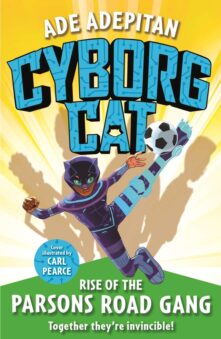Have you ever stopped to think about how much reading you do in a day? This webpage, the email your boss sent you this morning, that one groupchat that’s getting out of hand. If you’re a student you’ve got textbooks and research papers to deal with. If you’re an adult, you’ve got tax forms, health insurance forms, job applications and so on. Words are all around us, and many parts of our world are designed with the assumption that reading and comprehension happen quickly and effortlessly for everyone. But its not always so easy.
In today’s episode we talk about dyslexia, after reading ‘Fish in a Tree’ by Lynda Mullaly Hunt.
![Fish in a Tree by [Lynda Mullaly Hunt]](https://m.media-amazon.com/images/I/416oCMNedoL.jpg)
When this book opens up, we are in a sixth grade classroom with the main character, Ally. The title of the chapter is ‘In Trouble Again’ and this pretty much sums up Ally’s relationship with school. Ally is not keeping up with her assignments. Most teachers are frustrated with her, believing she is not putting in enough effort, or she’s trying to get attention.
Luckily for Ally, she has a new teacher who is truly interested in finding out the answer to that question ‘Why?’ Mr Daniels notices that she is very smart in conversation, good at math and problem solving, and very creative. Contrary to what she has come to believe, she is actually quite intelligent. But every time she has to read or write something, she really struggles, or she avoids doing it completely because she knows it’s going to be impossible. Because Mr Daniels doesn’t write her off as stupid or as a troublemaker, because he takes the time to observe the way she learns and the areas in which she struggles, he finally answers the big question correctly – Ally has dyslexia.
WHAT IS DYSLEXIA?
According to the Yale center for dyslexia and creativity, dyslexia is an unexpected difficulty in reading in an individual who has the intelligence to be a much better reader. It is the most common learning disability, and affects 10 to 20 percent of people. It also runs in families – there is often a parent, sibling, or someone else in the family who also has some difficulty reading .
People with dyslexia have difficulty matching written letters and letter combinations with the sounds they are supposed to make. This makes reading difficult. Writing, spelling and comprehension cans also be a challenge.
For very young children, this may look like:
- difficulty with reading the alphabet (matching a letter to its sound)
- difficulty pronouncing even simple words
- not recognizing the letters in their own name
- trouble with rhyming
For older kids, this may look like:
- reading very slowly, with many mistakes
- Difficulty figuring out how new words should sound
- Mixing up words that sound alike
- Understanding what they hear better than what they read
- Low interest/reluctance to read
- trouble with math once word problems are introduced
…and the list goes on
FEELING LIKE A FAILURE…
Having an unrecognized learning disability can be very distressing and can really affect a child’s self esteem. Ally doesn’t voluntarily speak up in class, she’s anxious whenever she called on, and homework is a struggle for her. There’s a lot of tears, frustration, and anxiety around schoolwork, so she resorts to escaping the situation. She pretends to be injured so she cant write, pretends to be sick so she can go to the nurses office, purposely gets in trouble so she can get sent to the principals office and avoid doing work.
Worst of all, Ally believes she is stupid and worries that she will never become anybody worthwhile. Of course other kids notice her struggles and bullying becomes an issue as well. Dyslexia has nothing to with intelligence, and it is important to reinforce this for dyslexic children who may struggle with feeling inferior. Be patient and encourage, and validate their strengths in other arenas as well.
DIAGNOSIS
Diagnosing dyslexia usually involves a series of tests, often performed by an educational psychologist or neuropsychologist. An official diagnosis is very important in order to have access to helpful accomodations through school. These tests will evaluate many areas such as:
- reading and writing skills
- language development
- how fast they can process written and spoken information
- learning styles
- vocabulary
- reasoning
- memory
Dyslexia is a lifelong condition. However with special teaching techniques and appropriate accomodations, most children will have positive improvements in their reading skills
WHAT HELPS?
- Reading aloud to children; using audiobooks
- Teaching reading techniques that work for the way dyslexic children learn (eg. structured literacy)
- Allowing more time for assignments, tests etc
- Voice-to-text and text-to-voice technology, to support writing and reading
Takeaways
- Dyslexia does NOT mean a lack of intelligence
- Unidentified learning disabilities can result in serious emotional distress for a child
- Early recognition of dyslexia, and appropriate accommodations will greatly increase a child’s chance of improving their reading skills and succeeding academically
Additional resources (with MUCH more information about dyslexia):
Yale Center for Dyslexia and Creativity
International Dyslexia Association
Interested in other children’s books touching on health conditions? Check out our bookshelf!

